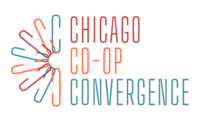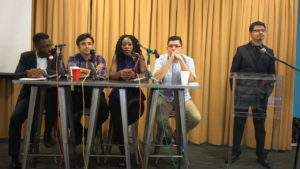Using Political Office To Increase The Cooperative Economy
This group of politicians is creating new perceptions of cooperativeness in government. From a municipal bank to ward-level cooperative economy support, let’s imagine a better world via cooperatives.
Notes
Carlos
- represents 55k working people as alderman of the 35
- Hermosa, logan square, Albany park and 2 more
- Prioritize neighborhoods and working families
- Commitment to ensure we have participatory democracy in the ward
- SO far: taking the things alderman have unilateral control of
- 1.3 M ward infrastructure
- zoning map amendments
- Everyone has a seat at the table and have meaningful say in the outcome of decisions made
- Empower people to have real power, at the heart of that is what we all really want which is to have real freedom
Amara
- profession a public policy consultant, Garfield park, organizer, mayoral candidate
- Worked at the campaign level and at the grassroots
- Background in cooperatives for years
- How do we replicated the values that we all hold in the working world and to rebuilt communities and our city to show what is possible?
- There was a limitation on our imagination
- The answers are there and the solutions are there
- This conference is proof that we have broken through
- Founder of the institute for cooperative economics built to bring together the entire ecosystem as well as our communities and elected officials and to develop a comprehensive legislative model to make this happen
- Please to see everything coming together.
Byron
- what it takes to change things today is…
- Thousands of residents of being displaced both in the city but in the world, we see the consequences of those policies and the atrocities that we have to face. How do we address things locally? The displacement and the austerity, how are we creative and innovative ways to deal with this. We need to hear and challenge myths that we should not accept. We need to change the narrative. We are empowering the residents. The city was so uncomfortable about talking about the PihCo cooperative in Pilsen. We cannot accept that we are broke. We have housing crisis, homeless crisis in the city and we need to talk about it. We can make it happen, collecting petitions, pressing elected, and making the world we need possible.
Ugo
- Running for alderman for the 40th, longtime residence, organizer, Latin Sol? DSA,
- Creating representative democracy for people to have direct control.
- Equity: understanding that equity and equality are not the same thing,
- Coops help us have upward mobility in our communities, making sure we are democratizing every aspect of our lives and everything that coops stand for. Making sure we have a city council that is not leaving coops without help they need to thrive.
-
Talking about the challenges that coops face in Chicago-land and the surrounding area: getting capital, laws on the books on governing coops, there is a lack of them. We need to make sure we are building the cooperative economy.
MUNICIPAL BANKING
Amara: What would the idea of collectivizing our financial needs look like in Chicago?
The way that we move out of this position we are in the city is by transformative economic policies, we cannot be afraid to put forth bold ideas that are grassroots level and at the top. Part of the public banking institute, across the country, the reason being is that we are confronting the idea that we are broke. Tax bank swaps?
Roads, infrastructure, the interest in million dollar projects is 50%, this is what we need to change and have financial institutions that relate to the public not the profit bottom line. We can develop our own financial products that support the growth of this sector in our economy. This is key to transforming the economy and the ecosystem. If we want to move away from austerity and the 1%, we have to put forth these bold solutions. Bank of North Dakota is the best performing bank in the country. It is legitimate and we have to have the will to do it.
It also addresses wealth building and generational wealth. If we’re serious about this, we need to have it on top of our agenda.
Carlos: it only takes the political courage to do so.
ALDERMANIC SUPPORT OF COOP ECONOMY
Carlos: The position of alderman is very unique because of the unilateral control of several things. How about empty lots in your ward? Empty lot sales have to be checked in with the alderman first. (take notes from audio here)
Leverage the power that they have with a negotiated sale to a non-profit for $1.
-Also, zoning and development. Campaign contributions and zoning are often linked.
-Community driven process engages in robust conversations and a Community Benefits Agreement.
-Boutique hotel example
WHAT IS POSSIBLE IN PILSEN?
Byron: Fund allocations. What we see is less and less investment in affordable housing. In Pilsen we have an affordable minimum requirements of 21% of affordable housing. Developers have just paid fines to avoid this.
-Policies are not enough, we need to have the political will to push them forward and enforce it.
-In Casa Aztlan example, the developer City Pads ? is the same developer evicting people in uptown. They are visible and clear. We have to be clear in what we’re demanding, the developers have the resources, but if they are not pushed, they will not do it bc they are not in the business to build inclusive communities. Support cooperatives, land banks, etc. we need public resources. TIF dollars should not be funding private stadiums. Housing as a human right. People across the ward want change, they want affordable housing.
Ugo: gentrification in the 40th ward, neighborhoods on the northside experience it too. Used to be home of working class folks. Wife of the current alderman and alderman deeply corrupt, Pat O’Connor. With community involvement of zoning, this wouldn’t have happened. People of color and working class people strategically bc pushed out.
LEGACY OF CHICAGO AND INSPIRATION TO RUN
Ugo: Many things, housing issues. Just eviction ordinance in the city, justified cause ordinance, also about thinking about where Chicago is in this current moment where CPS is segregated by race and by class. The cities books are balanced on the backs of poor people in Chicago. Regressive taxes rather than taxing the 1%. Also bc black and brown folks are afraid of the police and that shouldn’t be the case. We need to have alderman that understand how the economy is not working for working people. All of those things.
Amara: I think that it is important for us to put this entire election season in context. It is far bigger than one person. It’s really not about me, it’s about the future of this city. And bc of how Chicago is situated in this country and the world, it’s about the direction of this country and the world. We cannot focus just locally bc it is so much bigger than that. What are we willing to do to make those possibilities reality? I spent most of my last run talking to people about imagination and how we can create what we imagine. In the same way that we live in a greed and corruption filled city is the same way that we can create an alternative that is driven by the values that we hold of equity and access. Those are posibilties, and bc there are those of us who have commited ourselves to actualizing those posibilties it has brought us to this moennt so the decions that we have to make is what we’re willing to do to create that alternative. We know what happening in our neighborhoods, the problems, bc I think about what the solutions are and our energy is better spend in creating our new reality. We’re not looking for handouts.
There are certain things we won’t accept. Fill in with audio bc this is just too good to miss.
Coops are the future of our city and of the economy that we hope for.
Carlos: Socialism or barbarism.

